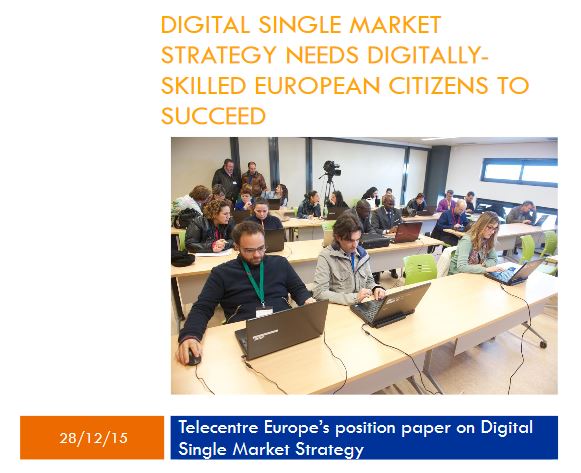08 May Digital Single Market Strategy could help boosting digital skills of Europeans
08 May, 2015
The Digital Single Market Strategy for Europe was presented on 6th May by VP Ansip and Commissioner Oettinger in front of EU officials and journalists at the European Commission. The event was also streamed online. With this strategy, the European Commission aims to ensure that the internal market in the digital world becomes a reality as in the real world.
The Strategy has three main pillars (the full document can be accessed here):
- Pillar 1 Access – here the Commission promises to reduce barriers in access to digital services, geographical restrictions on websites, reduce costs for deliveries from another country, etc. (part 2 of the full document)
- Pillar 2 Environment – measures to increase cyber security and improve rules for the telecom industry are foreseen (part 3 of the full document)
- Pillar 3 Economy and society – this is the most important pillar in our view, as it includes supporting an inclusive digital society, where all citizens have the skills to seize the opportunities of the digital world (this pillar is the future “hat” for initiatives such as the Grand Coalition for Digital Jobs, the European Code Week and our European Get Online Week). (part 4.3 of the full document).
Among the objectives of the Strategy are:
– Concluding negotiations on common EU data protection rules.
– Reform of telecoms rules.
– Modifying copyright rules to reflect new technologies, and to make them simpler and clearer.
– Simplifying consumer rules for online purchases.
– Making it easier for innovators to start their own company.
– Boosting digital skills and learning.
– Enjoying the same online content and services regardless of the EU country we are in.
The topics we are most concerned with are linked to e-skills, cyber security, uptake of e-services and ICT professionalism.
Telecentre Europe’s position:
The strategy will promote an inclusive e-society (see point 4.3 of the document). Under “Digital skills and expertise”, the Commission will work to ensure that every citizen has the necessary skills to benefit from e-services (e-government, e-justice, e-health, e-energy or e-transport), be fit for a job which requires a certain level of digital skills and actively participate in a digital society.
Telecentre Europe welcomes efforts to improve digital skills, and is keen to see strong action to tackle the challenge of the digital gap between those with essential ICT skills, and those without.
See also:








